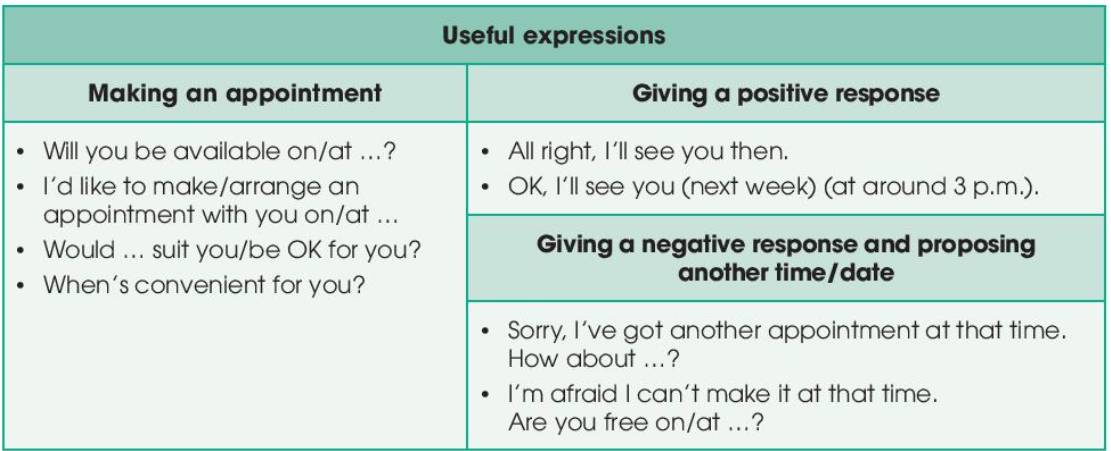Question: Make three similar conversations about these words hotel, museum, bookstore.

Những câu hỏi liên quan
Xin lỗi vì trong Tiếng Anh ko ai trả lời nên mk hỏi trong này. Thông cảm jum nha![]() !
!
Đề bài: Make three similar conversations about these words hotel, museum, bookstore.
Work in pairs. Use the models in 1 to make similar conversations about these predictions for the future. One of you is Student A, the other is Student B. Use the expressions below to help you.1. Student A thinks well use driverless buses and flying cars. Student B expresses certainty or uncertainty, and gives reasons.2. Student B thinks Al robots will do all the household chores. Student A expresses certainty or uncertainty, and gives reasons.
Đọc tiếp
Work in pairs. Use the models in 1 to make similar conversations about these predictions for the future. One of you is Student A, the other is Student B. Use the expressions below to help you.
1. Student A thinks we'll use driverless buses and flying cars. Student B expresses certainty or uncertainty, and gives reasons.
2. Student B thinks Al robots will do all the household chores. Student A expresses certainty or uncertainty, and gives reasons.
1.
Student A: Have you heard that they're planning to have driverless buses and flying cars in the future?
Student B: I'm pretty certain about the driverless buses, but I'm not so sure about the flying cars. There are still safety concerns and regulations that need to be addressed before we can make that a reality.
2.
Student B: Have you heard about the latest Al robots? They're supposed to be able to do all the household chores for us in the future.
Student A: I'm a bit uncertain about that. While the technology is advancing, I think there will still be limitations to what the robots can do, especially when it comes to tasks that require human intuition and decision-making.
Đúng 1
Bình luận (0)
Work in pairs. Use the model in 1 to make similar conversations for these situations. One of you is Student A, the other is Student B. Use the expressions below to help you.1. Student A is burning rubbish. Student B is warning him/her about the dangers of open waste burning to peoples health and the environment.2. Student B is building a campfire. Student A is warning him/her about the risk of starting a forest fire and the health risks. Useful expressions ...
Đọc tiếp
Work in pairs. Use the model in 1 to make similar conversations for these situations. One of you is Student A, the other is Student B. Use the expressions below to help you.
1. Student A is burning rubbish. Student B is warning him/her about the dangers of open waste burning to people's health and the environment.
2. Student B is building a campfire. Student A is warning him/her about the risk of starting a forest fire and the health risks.
Useful expressions
| |
Giving warnings
| Responding to warnings
|
I wouldn’t … if I were you. Watch out (for something)! I (must) warn you … Mind your …
| Thanks for (the) warning. I’ll be (more) careful (next time). Thanks. Oh, really? I didn’t know that. Thanks so much. |
Tham khảo:
A: Hey, have you seen me burning some rubbish here?
(Này, bạn có thấy tôi đốt rác ở đây không?)
B: Yeah, I see that. But do you know that burning waste like that can be dangerous to people's health and the environment?
(Vâng, tôi hiểu rồi. Nhưng bạn có biết rằng việc đốt rác thải như vậy có thể gây nguy hiểm cho sức khỏe con người và môi trường?)
A: Really? How come?
(Thật á? Vì sao?)
B: When you burn waste like that, it releases harmful toxins into the air, which can cause respiratory problems and other health issues. It can also harm the environment and pollute the air and soil.
(Khi bạn đốt chất thải như vậy, nó sẽ giải phóng các chất độc hại vào không khí, có thể gây ra các vấn đề về hô hấp và các vấn đề sức khỏe khác. Nó cũng có thể gây hại cho môi trường và gây ô nhiễm không khí và đất.)
A: Oh, I had no idea. Thanks for letting me know. I'll stop doing it and find a proper way to dispose of my waste.
2.
B: Hey, I'm building a campfire. Do you want to join me?
(Này, tôi đang đốt lửa trại. Bạn có muốn tham gia cùng tôi không?)
A: Sure, but be careful. Starting a fire in a forest can be risky, especially if it's dry and windy.
(Chắc chắn, nhưng hãy cẩn thận. Đốt lửa trong rừng có thể nguy hiểm, đặc biệt nếu thời tiết khô và nhiều gió.)
B: Don't worry, I know what I'm doing.
(Đừng lo lắng, tôi biết tôi đang làm gì.)
A: But even a small spark can start a big forest fire, which can be difficult to control and cause a lot of damage. It's also not safe for our health, as the smoke can cause respiratory problems.
(Nhưng ngay cả một tia lửa nhỏ cũng có thể gây ra một đám cháy rừng lớn, rất khó kiểm soát và gây ra nhiều thiệt hại. Nó cũng không an toàn cho sức khỏe của chúng ta vì khói có thể gây ra các vấn đề về hô hấp.)
B: I see your point. Maybe we should find a safer spot to make a fire or just use a portable stove instead.
(Tôi thấy quan điểm của bạn. Có lẽ chúng ta nên tìm một nơi an toàn hơn để đốt lửa hoặc chỉ sử dụng bếp di động để thay thế.)
A: Yes, that's a better idea. We can enjoy our time outdoors without putting ourselves and the environment at risk.
(Vâng, đó là một ý tưởng tốt hơn. Chúng ta có thể tận hưởng thời gian ở ngoài trời mà không gây nguy hiểm cho bản thân và môi trường.)
Đúng 2
Bình luận (0)
Work in pairs. Use the model in 1 to make similar conversations for these situations. One of you is Student A, the other is Student B. Use the expressions below to help you.1. Student A is talking about the activities he/she does on field trips to national parks. Student B expresses likes/dislikes about these activities.2. Student A and Student B are planning an eco-friendly class party. They talk about the things and activities they like or dislike at a party.
Đọc tiếp
Work in pairs. Use the model in 1 to make similar conversations for these situations. One of you is Student A, the other is Student B. Use the expressions below to help you.
1. Student A is talking about the activities he/she does on field trips to national parks. Student B expresses likes/dislikes about these activities.
2. Student A and Student B are planning an eco-friendly class party. They talk about the things and activities they like or dislike at a party.

1.
A: When we go on field trips to national parks, we always go hiking. It's my favorite activity.
(Khi chúng tôi đi thực địa đến các công viên quốc gia, chúng tôi luôn đi bộ đường dài. Đó là hoạt động yêu thích của tôi.)
B: I really love hiking. It's such a great way to explore the park.
(Tôi thực sự thích đi bộ đường dài. Đó là một cách tuyệt vời để khám phá công viên.)
A: We also do birdwatching, which I think is fun.
(Chúng tôi cũng xem chim, điều mà tôi nghĩ là thú vị.)
B: I'm not a fan of birdwatching. It's a bit boring for me.
(Tôi không thích ngắm chim. Đó là một chút nhàm chán đối với tôi.)
A: Another activity we do is camping. It's a great way to connect with nature.
(Một hoạt động khác mà chúng tôi làm là cắm trại. Đó là một cách tuyệt vời để kết nối với thiên nhiên.)
B: I can't stand camping. It's uncomfortable and I don't like sleeping outdoors.
(Tôi không thể cắm trại. Thật khó chịu và tôi không thích ngủ ngoài trời.)
2.
A: Let's plan an eco-friendly class party. We could have everyone bring their own reusable plates and cups.
(Hãy lên kế hoạch tổ chức một bữa tiệc trong lớp thân thiện với môi trường. Chúng ta có thể yêu cầu mọi người mang theo đĩa và cốc có thể tái sử dụng của riêng mình.)
B: I really love that idea. It's so important to reduce waste.
(Tôi thực sự thích ý tưởng đó. Nó rất quan trọng để giảm chất thải.)
A: We could also have a vegetarian potluck instead of ordering food.
(Chúng ta cũng có thể ăn lẩu chay thay vì gọi đồ ăn.)
B: I can't stand the idea of a vegetarian potluck. I love meat and wouldn't enjoy the food.
(Tôi không thể chịu được ý tưởng về một bữa tiệc thịnh soạn dành cho người ăn chay. Tôi yêu thịt và sẽ không thưởng thức các món ăn.)
A: How about instead of balloons, we have paper decorations that can be recycled?
(Thay vì bóng bay, chúng ta có đồ trang trí bằng giấy có thể tái chế thì sao?)
B: I really love that idea too. Balloons are fun but they create a lot of waste.
(Tôi cũng rất thích ý tưởng đó. Bóng bay rất thú vị nhưng chúng tạo ra rất nhiều rác thải.)
Đúng 1
Bình luận (0)
Think about a real holiday that you went on or an invented holiday. Make notes about these questions and write a blog post about your holiday. Write about 120-150 words. Write three paragraphs.Paragraph 1- your answers to 1 and 2Paragraph 2- your answers to 3Paragraph 3- your answers to 4 and 51 Where did you go?2 Who did you go with?3 What did you do that was very special/different?4 What did you like/not like about the holiday?5 What was boring/exciting/ amazing/ interesting/ annoying about th...
Đọc tiếp
Think about a real holiday that you went on or an invented holiday. Make notes about these questions and write a blog post about your holiday. Write about 120-150 words. Write three paragraphs.
Paragraph 1- your answers to 1 and 2
Paragraph 2- your answers to 3
Paragraph 3- your answers to 4 and 5
1 Where did you go?
2 Who did you go with?
3 What did you do that was very special/different?
4 What did you like/not like about the holiday?
5 What was boring/exciting/ amazing/ interesting/ annoying about the holiday?
Make question for the underline words
‘’ Ha Noi Phở ” is about 40.000 VND per bowl
Our hotel receptionists use English, French and Vietnammese in communication
I try to study English because it is very use for my future job
They start serving breakfast for the guests at 7 am
I want to work in this French restaurant because I can learn cooking a lot of European dishes
Think about a real holiday that you went on or an invented holiday. Make notes about these questions and write a blog post about your holiday. Write about 120-150 words. Write three paragraphs. Paragraph 1- your answers to 1 and 2 Paragraph 2- your answers to 3 Paragraph 3- your answers to 4 and 5 1 Where did you go? 2 Who did you go with? 3 What did you do that was very special/different? 4 What did you like/not like about the holiday? 5 What was boring/exciting/ amazing/ interesting/ annoying...
Đọc tiếp
Think about a real holiday that you went on or an invented holiday. Make notes about these questions and write a blog post about your holiday. Write about 120-150 words. Write three paragraphs. Paragraph 1- your answers to 1 and 2 Paragraph 2- your answers to 3 Paragraph 3- your answers to 4 and 5 1 Where did you go? 2 Who did you go with? 3 What did you do that was very special/different? 4 What did you like/not like about the holiday? 5 What was boring/exciting/ amazing/ interesting/ annoying about the holiday?
XI. ARRANGETHE WORDS AND PHRASES GIVEN IN ORDERTO MAKE MEANINGFUL SENTENCES.Question 51. hours / boat / got / main / after / traveling / to / island / three / by / the / we //. Question 52. language centre / would like / about / and / interested / your / information /I/learning / some/I / in / am / English //. Question 53. wanted / clearly / the front line / the President / we / so / to see / stood / in / we. Question 54. people / mountain resorts / some rest / hard - working / many / go t...
Đọc tiếp
XI. ARRANGETHE WORDS AND PHRASES GIVEN IN ORDERTO MAKE MEANINGFUL SENTENCES.
Question 51. hours / boat / got / main / after / traveling / to / island / three / by / the / we //.
Question 52. language centre / would like / about / and / interested / your / information /I/learning / some
/I / in / am / English //.
Question 53. wanted / clearly / the front line / the President / we / so / to see / stood / in / we.
Question 54. people / mountain resorts / some rest / hard - working / many / go to / to have / a / after/week.
Question 55. the sun / the roof / solar panels / on / of / the energy / installed / a house / from / are / to receive.
1 After three hours traveling by boat, we got to the main island
2 I am interested in learning English and I would like some information about your language centre
3 We wanted to see the President clearly so we stood in the front line
4 Many people go to mountain resorts to have some rest after a hard – working week.
5 Solar panels are installed on the roof of a house to receive the energy from the sun
Đúng 2
Bình luận (0)
Work in pairs. Use the model in 1 to make similar conversations for these situations. One of you is Student A, the other is Student B. Use the expressions below to help you.1. Student A, a secondary school student, makes an appointment to see Student B, a university representative, to ask for advice on his/her education plans after leaving school. Student B can’t make the suggested day/time and proposes another day / time.2. Student B, a secondary school student, makes an appointment to see Stud...
Đọc tiếp
Work in pairs. Use the model in 1 to make similar conversations for these situations. One of you is Student A, the other is Student B. Use the expressions below to help you.
1. Student A, a secondary school student, makes an appointment to see Student B, a university representative, to ask for advice on his/her education plans after leaving school. Student B can’t make the suggested day/time and proposes another day / time.
2. Student B, a secondary school student, makes an appointment to see Student A, a career advisor, to ask for advice on vocational courses. Student A can‘t make the suggested day / time and proposes another day / time.

[ 1 ] Student A: Hi there, do you need any help with your exercise routine?
Student B: Yes, please. I'm having a hard time with this one.
Student A: Let me help you with that. Here, let me show you the proper form.
Student B: That's very kind/nice of you. Thanks for your help.
Student A: Is there anything else I can do for you?
Student B: No, thank you. I think I'm good now.
[ 2 ] Student A: Excuse me, do you know where the healthy snacks are?
Student B: Yes, they are in aisle 3. Can I help you find anything else?
Student A: Actually, yes. I'm trying to find some low-sugar cereal for my kids.
Student B: Let me show you where it is. Here it is. That’s very kind/nice of you.
Student A: Thank you very much. Is there anything else I can do for you?
Student B: No, thanks. I think I’m fine now.
Đúng 1
Bình luận (0)

















